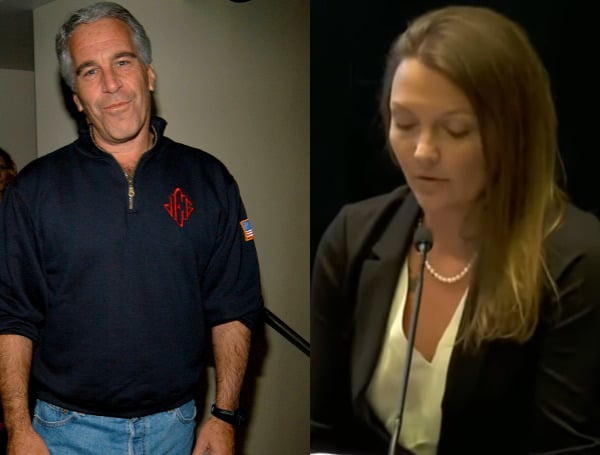TALLAHASSEE, FL. - The U.S. Supreme Court on Tuesday refused to take up an appeal by one of notorious sex offender Jeffrey Epstein’s victims who wage
TALLAHASSEE, FL. – The U.S. Supreme Court on Tuesday refused to take up an appeal by one of notorious sex offender Jeffrey Epstein’s victims who waged a more than decade-long legal battle contending that federal prosecutors violated her rights.
The Supreme Court, as is common, did not give its reasons for refusing to take up the case filed by Courtney Wild. But the decision effectively let stand a ruling last year by the 11th U.S. Circuit Court of Appeals that sided with the federal government.
Wild, one of the late financier’s numerous underage victims, argued that prosecutors violated her rights under a law known as the Crime Victims’ Rights Act when they secretly negotiated a deal in 2007 that shielded Epstein from federal criminal charges.
After learning about the non-prosecution agreement, Wild filed a lawsuit in federal court in South Florida that alleged prosecutors violated her rights to be able to confer with the government’s lawyers and to be treated fairly by them.
In a petition last year asking the Supreme Court to hear the case, Wild’s attorneys pointed to “sweeping implications” of the case for proper enforcement of the Crime Victims’ Rights Act.
“The CVRA (Crime Victims’ Rights Act) promises crime victims in federal cases a right to confer with prosecutors,” the petition said. “Yet in this case, one of the most infamous child sex traffickers in this country’s history — Jeffrey Epstein, a man with wealth, power, and political influence — was able to negotiate a secret non-prosecution agreement with federal prosecutors. The resulting tragedy was that the child victims who bravely came forward to report their sexual abuse were, as the en banc (11th U.S. Circuit Court of Appeals) decision below acknowledged, ‘left in the dark — and, so it seems, affirmatively misled — by government lawyers’ as to why Epstein was not being federally prosecuted for his horrific crimes.”
But the April 2021 appeals-court ruling said the Crime Victims’ Rights Act did not authorize Wild to ask a judge to enforce her rights in a “freestanding civil action.”
The appeals-court majority said that because the federal government “never filed charges against Epstein, there was no preexisting proceeding in which Ms. Wild could have moved for relief under the CVRA, and the act does not sanction her stand-alone suit.”
In a brief filed Jan. 4 at the Supreme Court, U.S. Department of Justice attorneys echoed that conclusion, saying the central issue in the case was “whether the CVRA permits freestanding suits in the absence of a criminal prosecution.”
“If a victim can bring a freestanding suit asserting a CVRA violation when a criminal prosecution has not been commenced by reason of a NPA (non-prosecution agreement), nothing in the statute bars victims from bringing freestanding suits to remedy asserted CVRA violations when criminal prosecutions are not commenced for other reasons, such as a prosecutorial declination, a lack of evidence, a need for continued investigation, an opportunity to build on a suspect’s cooperation, a lack of resources or some other basis,” the brief said.
The Justice Department attorneys, however, acknowledged errors in the way prosecutors handled the Epstein case.
“The abuse and trauma endured by petitioner (Wild) and the many other victims of Jeffrey Epstein’s sex-trafficking crimes are profoundly distressing,” the brief said. “The government deeply regrets that it did not communicate more clearly and forthrightly with petitioner and other victims during its initial investigation of Epstein’s federal crimes.”
Under the deal approved by prosecutors in 2007, Epstein sidestepped federal charges and agreed to plead guilty to two state prostitution charges, including procuring a minor for sex. The plea deal also provided immunity from federal prosecution for Epstein, four other named co-conspirators and “any potential co-conspirators.”
After the plea agreement on state charges, Epstein was arrested in July 2019 and charged with federal sex-trafficking offenses involving minor girls from Florida and other places. He was found dead in a jail cell a month later in what was deemed a suicide.
In pursuing the lawsuit, Wild sought to undo the non-prosecution agreement so that Epstein’s alleged co-conspirators could be punished for crimes perpetrated against her and other young girls.
Wild’s attorneys, in the petition filed last year at the Supreme Court, wrote that “there is no guarantee that the government will disclose its clandestine NPAs, much less disclose them in a way that would permit the kind of district and appellate court challenges that occurred here.” The petition also said the 11th U.S. Circuit Court of Appeal misapplied a legal precedent.
“The consequence was to ‘gut’ the Crime Victims’ Rights Act and create a two-tier system of justice, in which wealthy defendants can conspire with prosecutors to reach agreements that entirely exclude victim input and thwart transparency with the public,” the petition said.
Visit Tampafp.com for Politics, Tampa Area Local News, Sports, and National Headlines. Support journalism by clicking here to our GoFundMe or sign up for our free newsletter by clicking here.
Android Users, Click Here To Download The Free Press App And Never Miss A Story. Follow Us On Facebook Here Or Twitter Here.

COMMENTS